Key takeaways:
- Reparations aim to address historical injustices through acknowledgment, community resources, and potential economic empowerment, rather than just financial compensation.
- Debates on reparations highlight deep emotional responses, the need for awareness, and the challenge of implementing effective solutions that honor historical wrongs.
- Arguments against reparations focus on eligibility challenges, funding concerns, and the perception that historical injustices are irrelevant to current societal issues.
- The future of reparations discussions may lead to inclusive dialogues and legislative action, emphasizing the role of education in fostering understanding of social justice and equity.
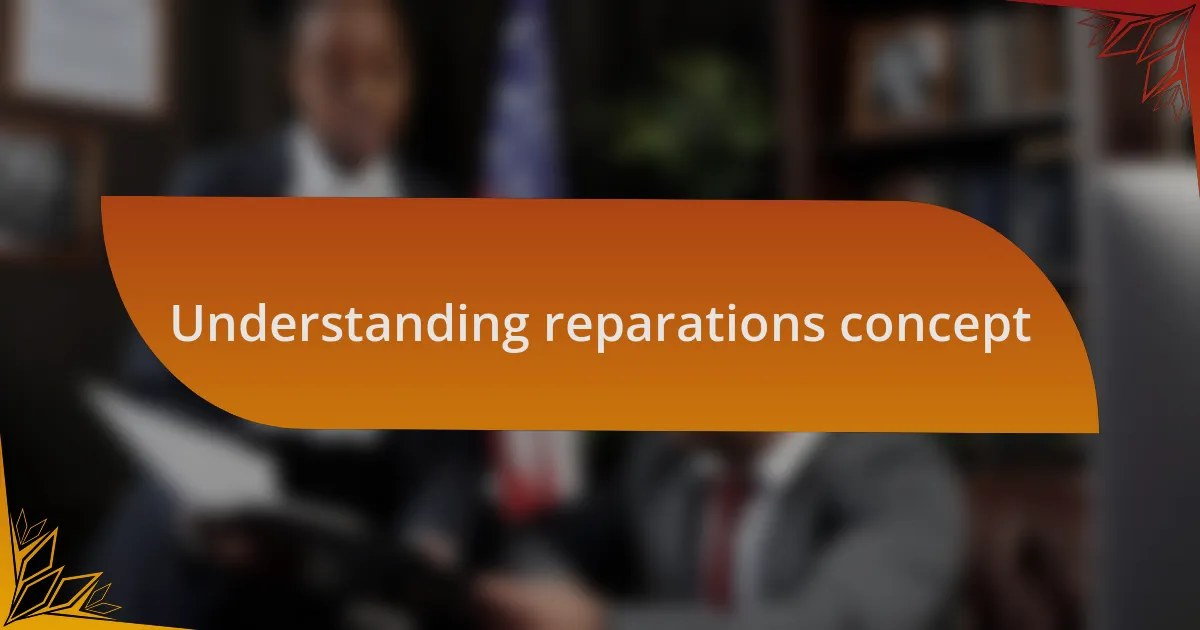
Understanding reparations concept
Reparations, at its core, is about acknowledging historical injustices and attempting to rectify them. I remember sitting in history class, feeling a mixture of anger and sorrow as we discussed systemic racism and its lingering effects. It made me wonder: how can we genuinely heal if we don’t address the harms of the past?
When we dive deeper into the concept of reparations, it’s essential to understand that it’s not just about financial compensation. It encompasses acknowledging suffering, providing resources for education, healthcare, and community development. Isn’t it fascinating how these broader aspects can lead to genuine transformation in society? For instance, funding for community initiatives can create opportunities that uplift entire neighborhoods.
Personally, I’ve seen the impact that targeted reparations can have on marginalized communities. A close friend of mine benefited from a scholarship program designed for those historically disenfranchised, and I witnessed firsthand the ripple effect of that support—her success inspired others around her. This experience left me pondering: can reparations be a pathway to reconciliation and collective progress?
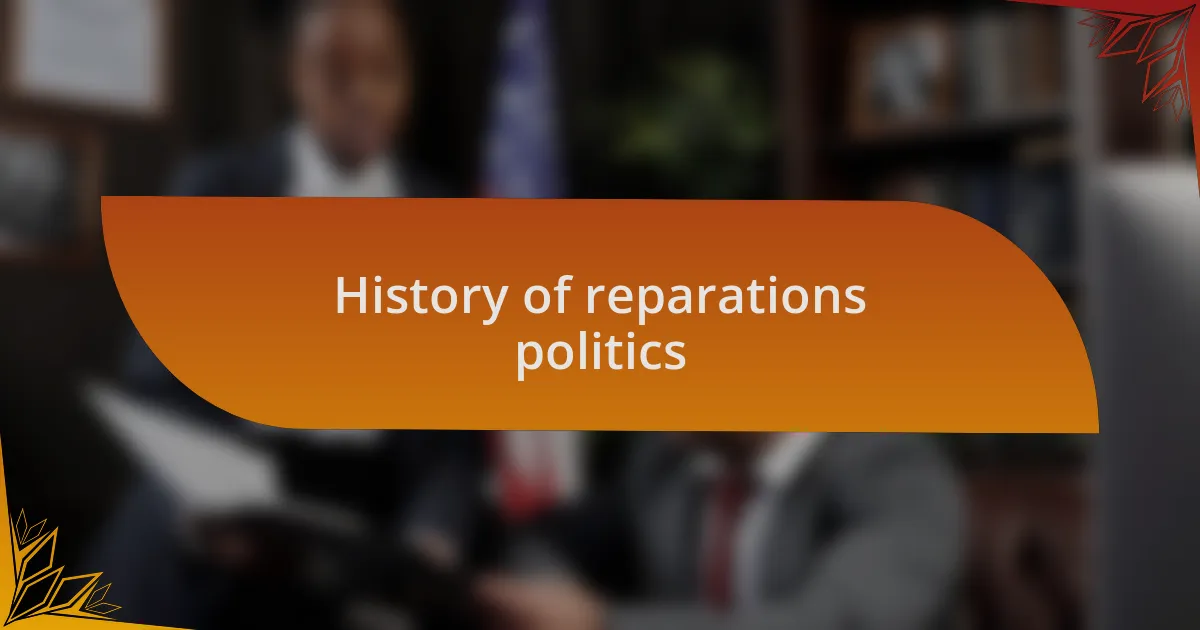
History of reparations politics
The concept of reparations traces its roots back centuries, often tied to the aftermath of slavery and colonialism. In the early 19th century, I find it compelling how debates surged around the compensation for enslaved people after emancipation. The idea that financial restitution could aid in healing wounds caused by generations of exploitation sparked fervent discussions.
Throughout the 20th century, these conversations continued to evolve. For instance, I remember reading about the reparations given to Japanese Americans who were interned during World War II. It made me reflect on how society sometimes has the courage to acknowledge its wrongs, even if it’s long overdue. What if the lessons learned from such cases could inform current reparations debates for African American communities?
More recently, movements advocating for reparations have gained momentum. Watching these efforts unfold has been inspiring yet daunting. It brings me to question: can the acknowledgment of past injustices truly pave the way for systemic change today? The ongoing advocacy reminds us that reparations are not just about compensation; they symbolize a commitment to building a more equitable society.
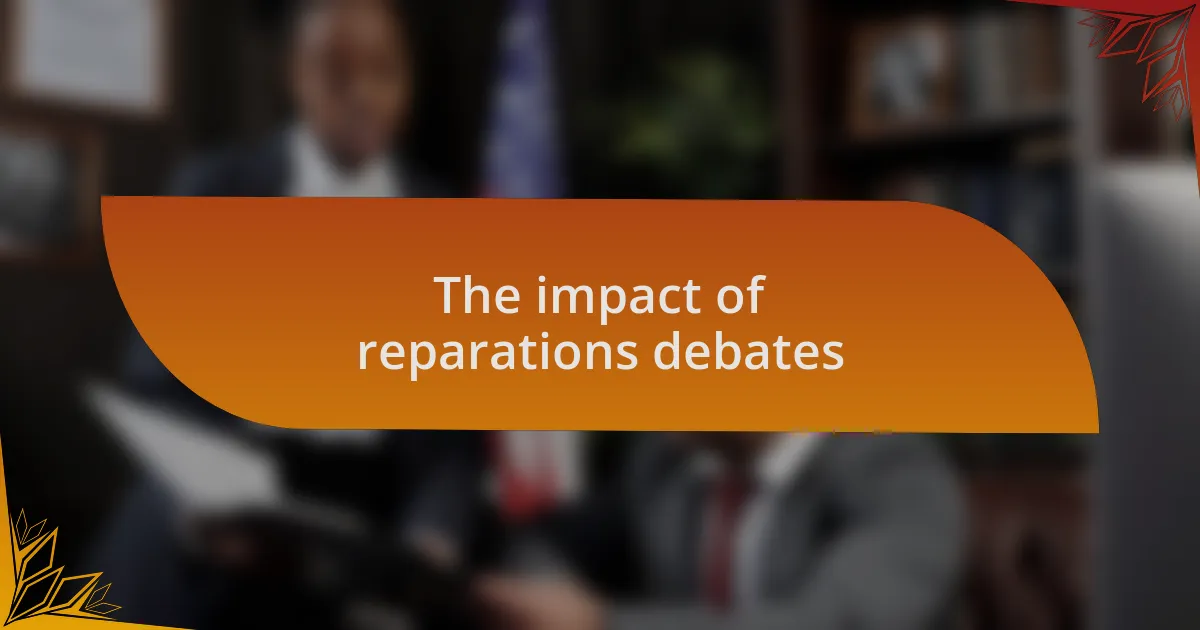
The impact of reparations debates
The debates surrounding reparations have sparked intense emotional responses and discussions about justice and equity. I’ve observed how these conversations often highlight the deep-seated pain and trauma that many communities still carry. When I hear personal stories of those affected by systemic injustices, it strikes a chord with me. It makes you wonder, can financial restitution truly address these historical wounds, or is it merely a band-aid on a much larger issue?
Moreover, the impact of reparations debates stretches beyond just economics; it influences public consciousness and policy-making. I recall a town meeting where residents passionately shared their views on reparations, illustrating how this issue can unite or divide communities. It became evident to me that these discussions are forging a path toward greater awareness and understanding of racial dynamics. But is raising awareness enough, or do we need to take bolder steps to transform this dialogue into tangible actions?
It’s fascinating to see how reparations conversations are challenging long-held narratives. I find myself reflecting on how these debates force us to confront uncomfortable truths about our history. What if we viewed reparations not just as compensation, but as a shared responsibility toward healing and restoring dignity? The potential impact of these discussions could shape a new societal framework that honors the past while striving for a better future.
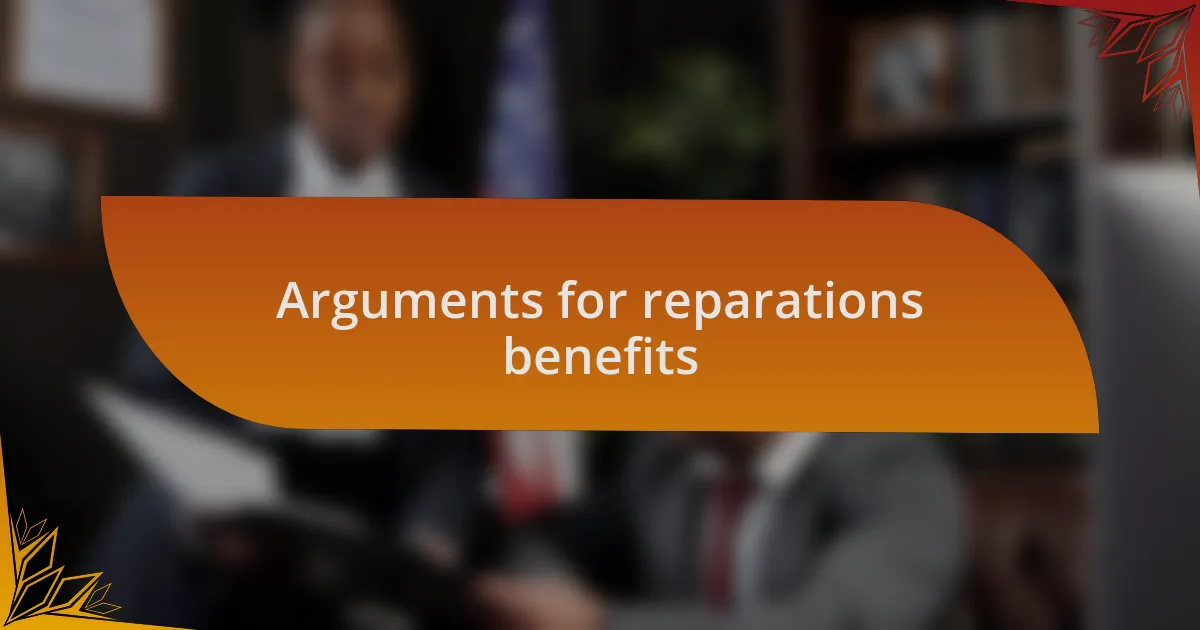
Arguments for reparations benefits
The case for reparations benefits is compelling when we consider the historical context. Many communities have been economically disadvantaged for generations due to systemic injustices. I remember hearing a business owner share how the lack of generational wealth impacted her access to capital. It made me realize that reparations could provide a pathway to economic empowerment, enabling individuals to start businesses and invest in their communities.
Additionally, the psychological benefits of reparations cannot be overlooked. I’ve spoken with many who feel a sense of validation when they see acknowledgment and restitution for past wrongs. It acts as an important step toward healing, making individuals feel recognized and valued. Isn’t it essential for people to see that their struggles are acknowledged, especially when those challenges stem from historical injustices?
Furthermore, reparations can foster greater societal unity. I recall a discussion with friends from diverse backgrounds, where the topic of reparations led to a deeper understanding of each other’s experiences. This dialogue opened new avenues for empathy and support. If implemented thoughtfully, could reparations not only bridge gaps of inequality but serve as a catalyst for collective progress toward a more just society?
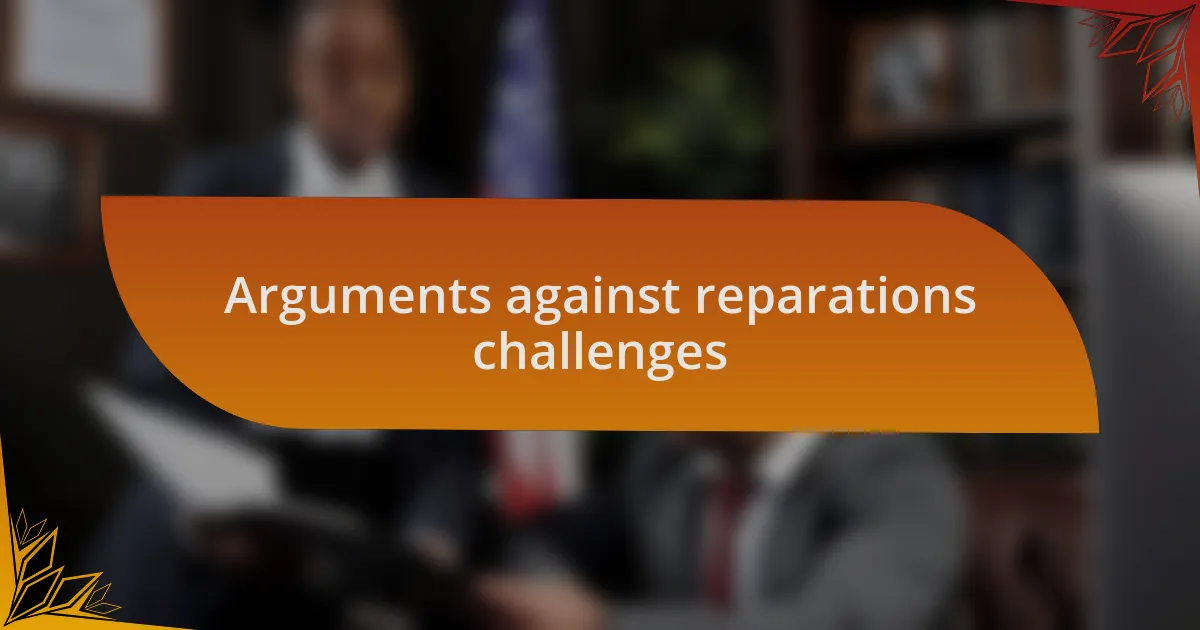
Arguments against reparations challenges
One of the primary arguments against reparations is the concern over who should qualify as beneficiaries. When I discussed this with a friend, she raised a valid point: how do we determine who is entitled to reparations? The diversity within affected communities complicates eligibility criteria, leading to potential disputes and feelings of exclusion among those whose experiences of injustice differ significantly.
Another challenge revolves around the funding and implementation of reparations. I remember attending a community forum where local leaders debated this issue. One speaker passionately argued that sourcing funds for reparations could divert resources from pressing needs like education or healthcare. This raises an important question: can we effectively balance the promise of reparations with the necessity of current social services without compromising either?
Moreover, the concept of reparations can evoke resistance among those who may not perceive the historical injustices as relevant to today’s societal issues. I encountered this viewpoint during a discussion with colleagues. Some expressed disbelief that past injustices should affect modern policy, suggesting that meritocracy should be the focus instead. But can we truly ignore the lasting effects of those injustices while striving for a fair and equitable society? This dilemma requires thorough exploration if we want to advance the reparations conversation constructively.
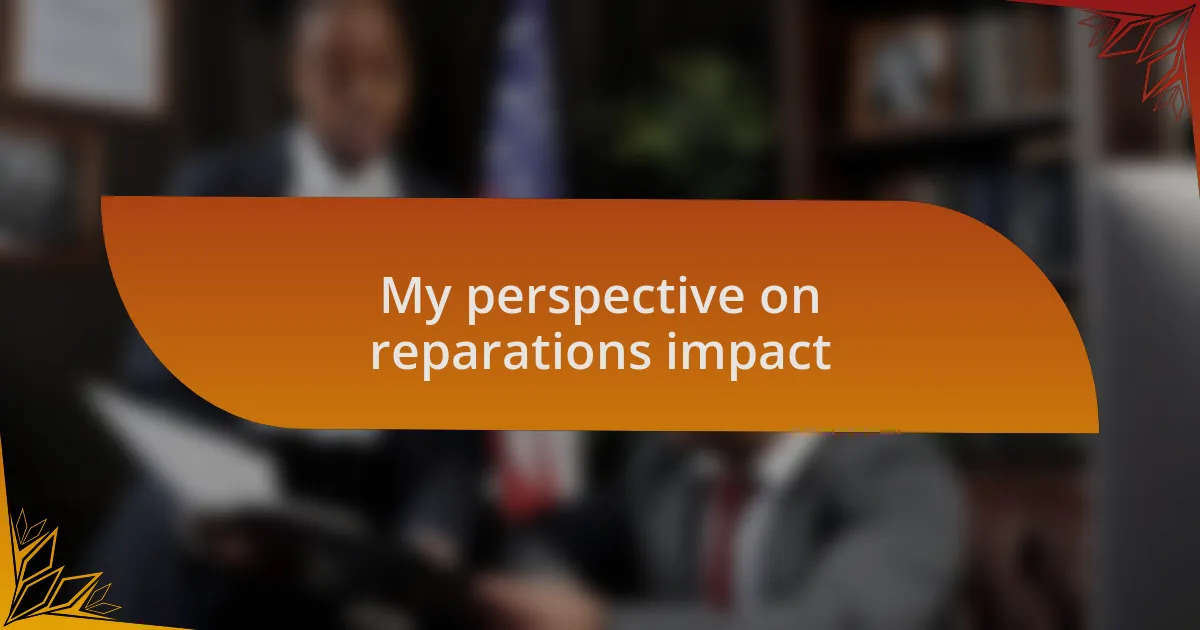
My perspective on reparations impact
I believe the impact of reparations could be transformative for both individuals and communities. I recall a conversation with an elder in my neighborhood who shared her story of generational trauma stemming from historical injustices. She expressed how reparations, in her view, could not only provide financial relief but also foster a sense of recognition and validation for those who have suffered. Can you imagine how empowering it might feel to have one’s pain acknowledged and addressed in a tangible way?
Through my observations, I’ve seen how reparations can serve as a catalyst for broader social change. When I was part of a community organizing effort, we discussed how addressing past wrongs could spark vital conversations about equity in present-day policies. It’s exciting to think about how reparations could push society to confront uncomfortable truths, prompting a collective movement towards justice. Wouldn’t it be refreshing to see communities come together, united by a shared commitment to rectify historical grievances?
On a personal level, I often ponder the emotional impacts of reparations. I had an impactful experience attending a workshop that focused on the historical implications of slavery and its legacy. Participants shared stories filled with pain and resilience, and I was struck by the common sentiment: healing requires acknowledgment. It made me realize that reparations are not just about monetary compensation; they symbolize a chance for reconciliation and healing, nurturing a future rooted in understanding and equity. How can we deny the importance of such healing in our society?
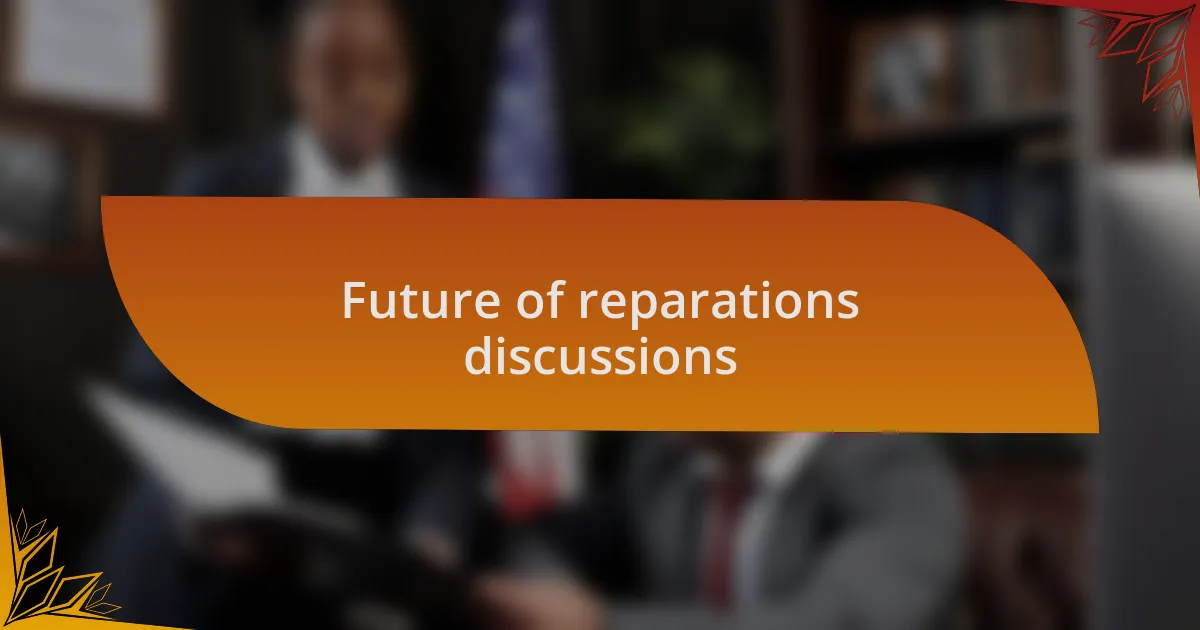
Future of reparations discussions
The future of reparations discussions is likely to evolve into a more inclusive platform, where diverse voices play a crucial role. I recall sitting in a diverse community forum where individuals from different backgrounds shared their perspectives on reparations. It was eye-opening to see how each experience shaped their understanding of justice and compensation. This kind of exchange not only enriches the conversation but emphasizes the need for a more holistic approach to reparations that goes beyond just financial compensation.
As conversations gain momentum, I foresee a shift toward legislative action that reflects the urgency of this issue. I remember attending a rally where passionate attendees advocated for reparations. The energy was palpable, sparking a realization in me that collective advocacy can push policymakers to take reparations seriously. If we continue to amplify these discussions, I believe we can create a ripple effect that influences policy reforms aimed at addressing systemic inequalities.
Looking ahead, I can’t help but think about the role of education in fostering understanding about reparations. In my experience volunteering at local schools, I’ve noticed the power of history lessons that include the stories of marginalized communities. Imagine if future generations grew up with a deeper awareness of reparations; those discussions could lead to more informed citizens who understand the importance of social justice and equity. How can we make sure that this knowledge transforms into advocacy and action?